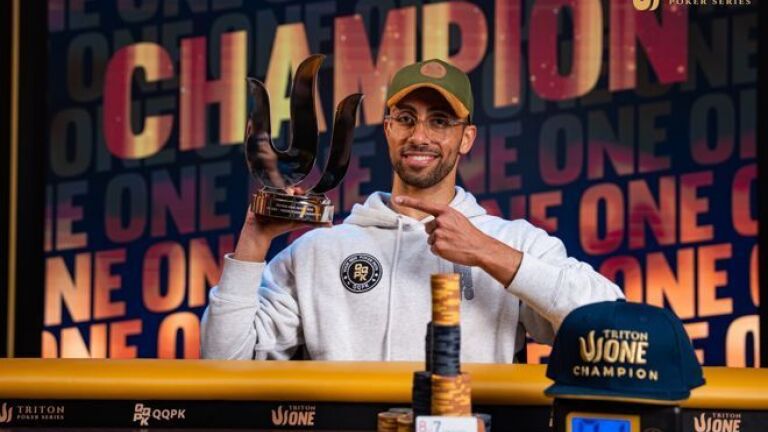The two players sit behind relatively large stacks, running well in the tourney. We receive from the dealer
 K
K  Q and raise to 3,500 in chips from an early position. Olaoluwa Okelola calls from behind and Ivey too, from the BB – the three players with the largest stacks at the table are now in action.
Q and raise to 3,500 in chips from an early position. Olaoluwa Okelola calls from behind and Ivey too, from the BB – the three players with the largest stacks at the table are now in action.The flop comes
 Q
Q  7
7  4 , giving us a top pair. Ivey checks and we open for 5,500 into the 12,900 pot, a normal bet with any hand. Okelola calls but Ivey check-raises to 18,000, a surprising turn of events indeed. The board is dry, we have a top pair, we get a call but Ivey check-raises? What can he have?
4 , giving us a top pair. Ivey checks and we open for 5,500 into the 12,900 pot, a normal bet with any hand. Okelola calls but Ivey check-raises to 18,000, a surprising turn of events indeed. The board is dry, we have a top pair, we get a call but Ivey check-raises? What can he have?
Since draws are all but impossible (maybe an open-end straight with 6-5), Ivey’s hand is largely polarised: either he has a monster (7-7 or 4-4), or he is bluffing. But it is still too early for us to give up our hand so we call; this makes sense as a raise would prompt a call from stronger hands only and would make them fold anything else, not to mention that Okelola is still sitting behind us and he might as well have a monster. By calling, we retain the option to reassess our position on the turn.
Okelola then folds and the turn comes
 J .
J .The pot is now 54,400 and Ivey opens for 35,000. For us, not much has changed. If we were ahead on the flop, now even more so, except if Ivey has K-J – but he would not have check-raised the flop with that. The problem is now that we have to know for sure, what action should follow on the river. Basically, we are left with no other real option than to call for a second time.
So we call and there is now 124,400 in the pot, with both us and Ivey left with a little more. The river comes
 Q .
Q .Without further ado, Ivey shoves his remaining 138,800. While we have queen trips now, our opponent goes all-in. A backdoor flush is now also a possibility but, given the action so far, it is unlikely to be the case. The decision is extremely difficult: Ivey either has 7-7 or 4-4, or nothing. Because of the flop check-raise, Q-J and A-Q are also out of question.
At this point, Mader decides to fold. A smart move: Ivey does, in fact, show
 4
4  4 for a full house, making Mader draw dead already on the turn.
4 for a full house, making Mader draw dead already on the turn.
Later, Ivey said he was disappointed and he should have made the fold but impossible for Mader. As it turns out, Mader doubled up on Ivey a bit later and ended up finishing 43rd for $185,000. Ivey was eliminated later that day, his trips threes being cracked by Max Steinberg’s set of tens. His decision to go all-in on the river was still a professional move, as he knew his opponent would in most cases have the queen, which would be very hard to fold, especially since he had extremely polarised his hand with the all-in. Mader had to have a very good instinct to keep him from the fatal call and he made a decision that earned him the respect of the likes of Phil Laak and Antonio Esfandiari.
Go to 26:00 in the video below the watch the hand in the ESPN coverage.
Original hand analysis by Pokerzeit.com.















0 comments